人教新目标版英语九年级全Unit 3 Could you please tell me where the restrooms are?Section B 2a-2d课件(30张PPT无素材)
文档属性
| 名称 | 人教新目标版英语九年级全Unit 3 Could you please tell me where the restrooms are?Section B 2a-2d课件(30张PPT无素材) | 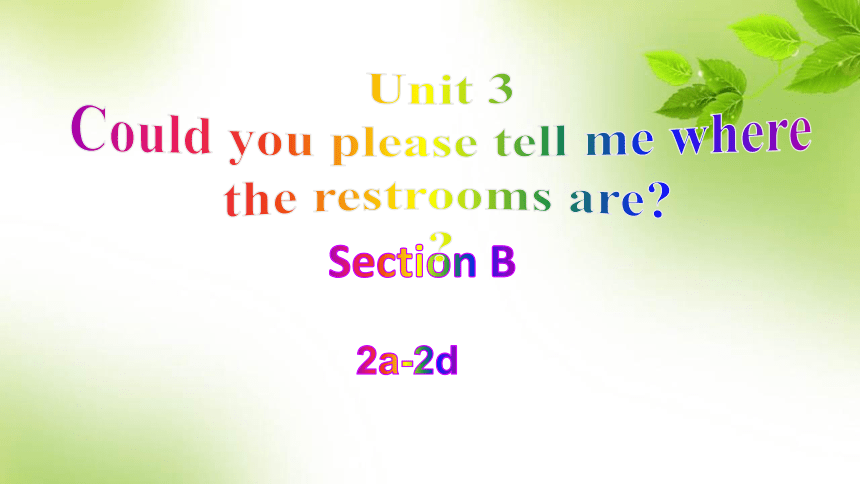 | |
| 格式 | pptx | ||
| 文件大小 | 3.2MB | ||
| 资源类型 | 教案 | ||
| 版本资源 | 人教新目标(Go for it)版 | ||
| 科目 | 英语 | ||
| 更新时间 | 2021-08-14 22:45:58 | ||
图片预览

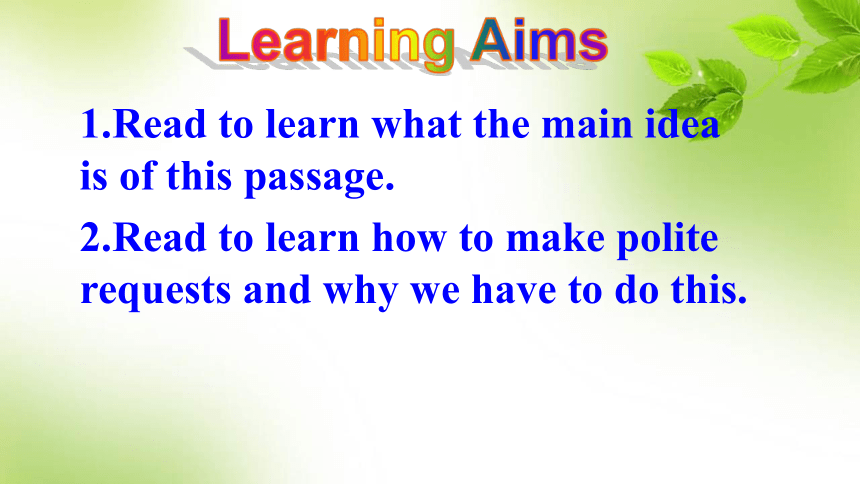
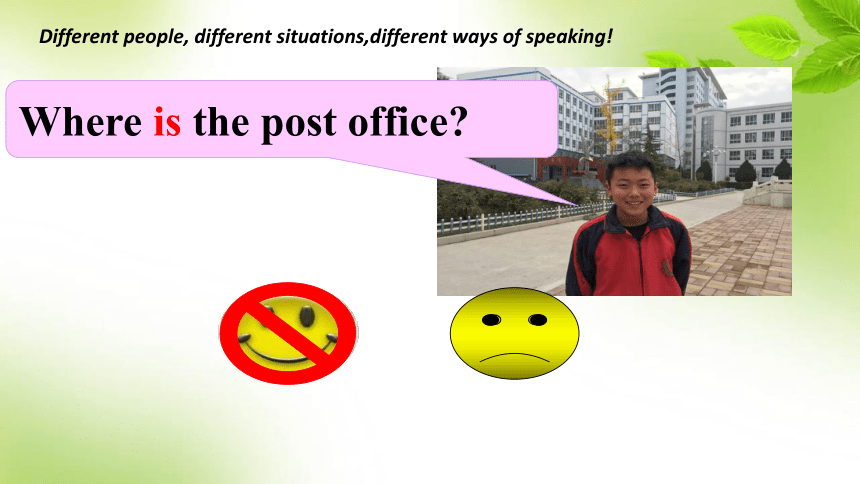
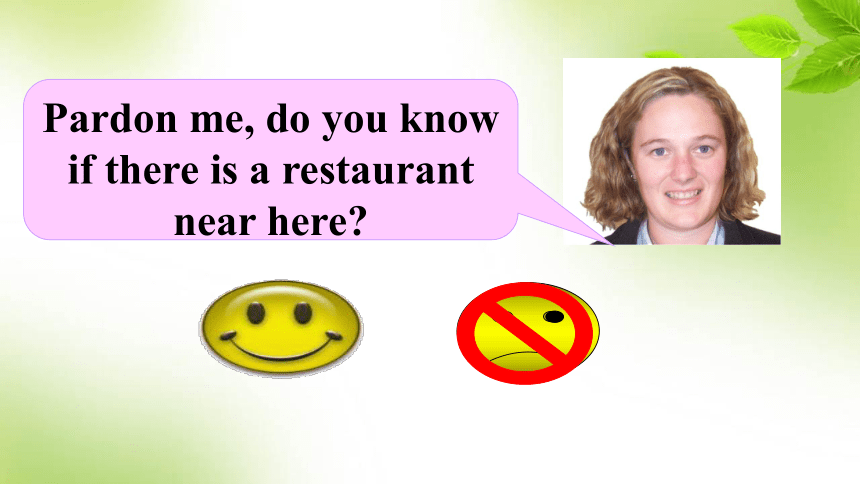
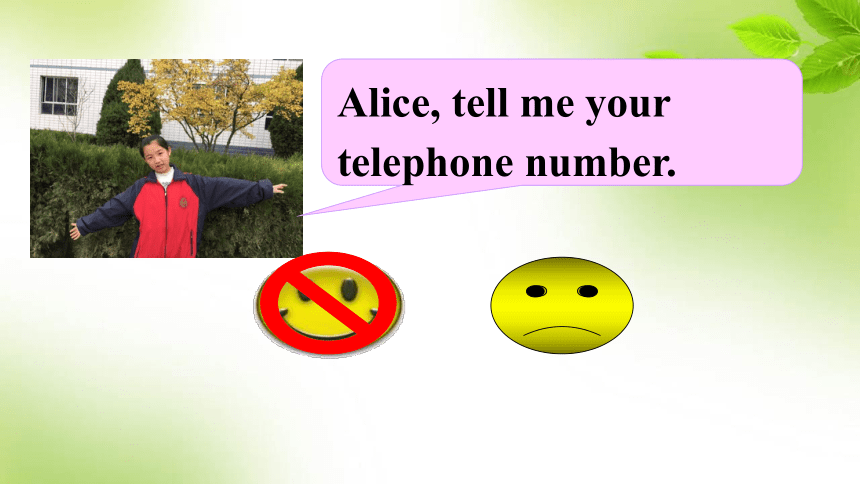
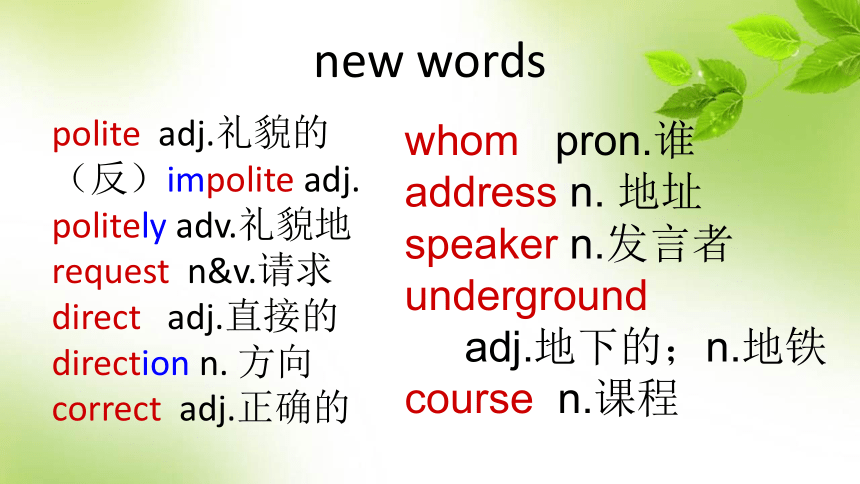
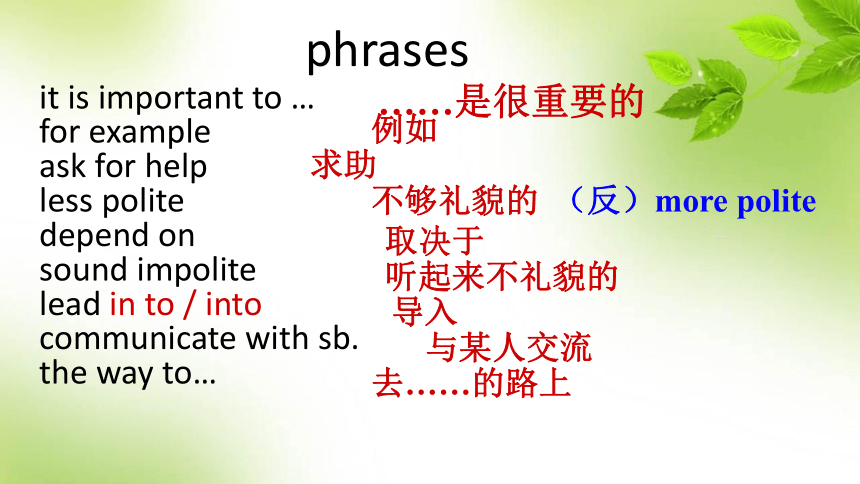
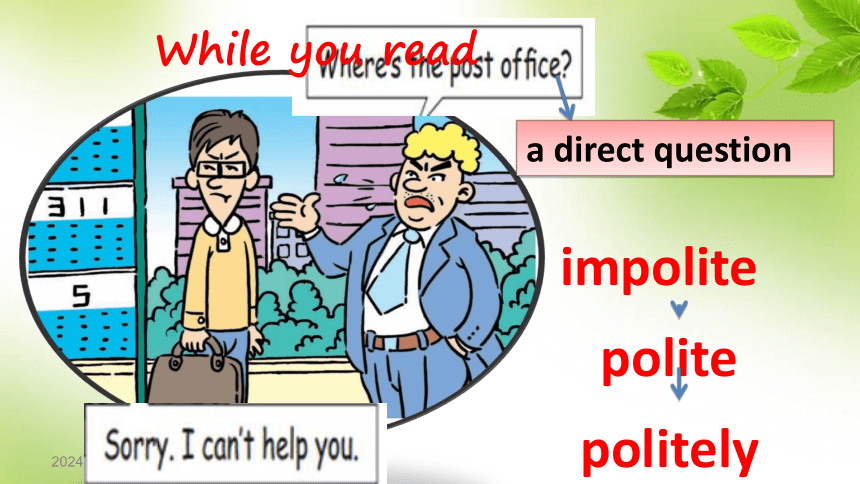
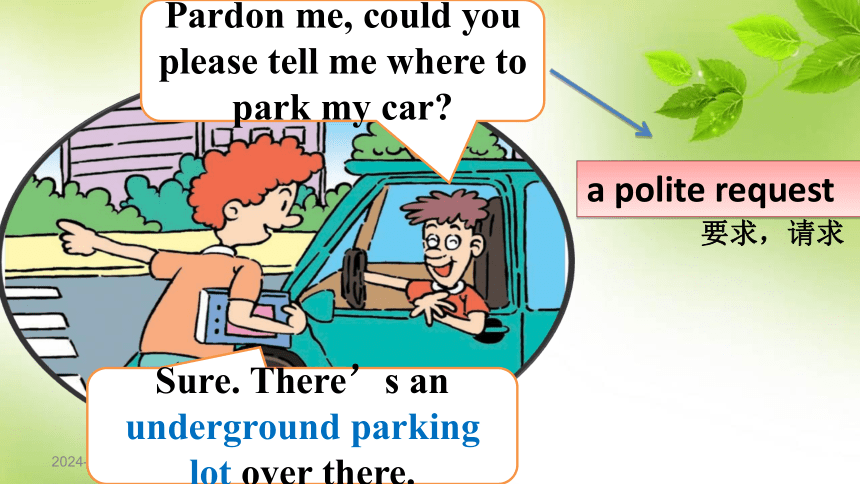
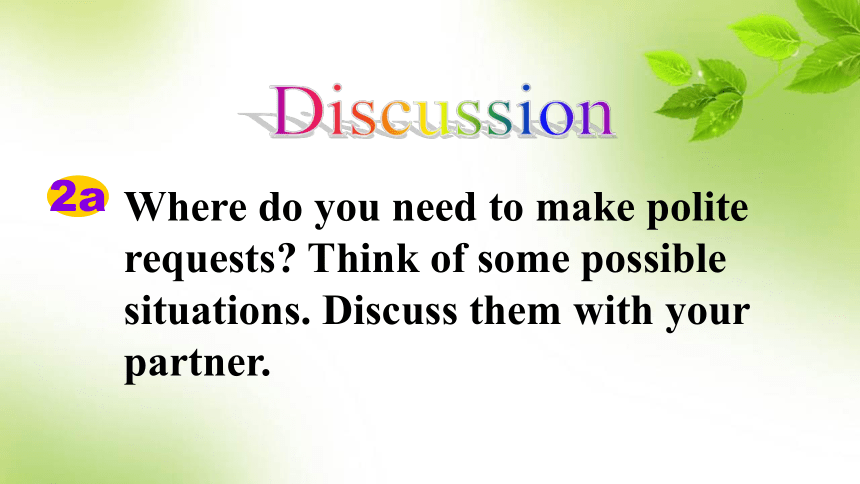
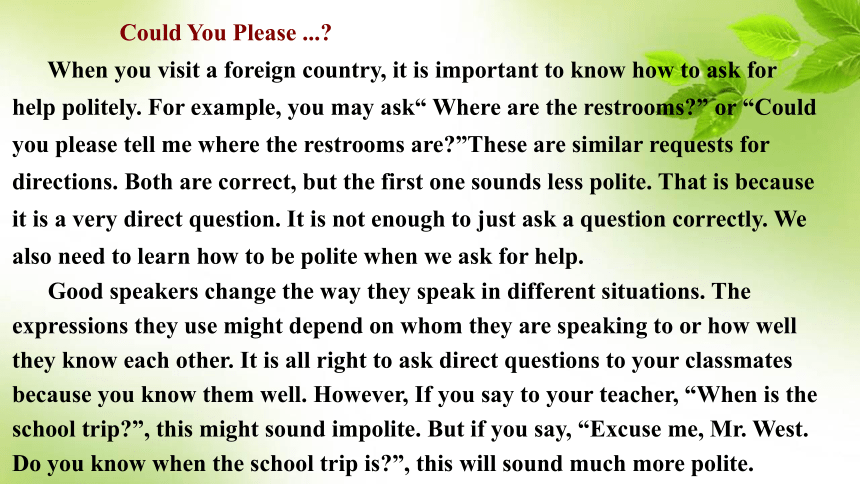
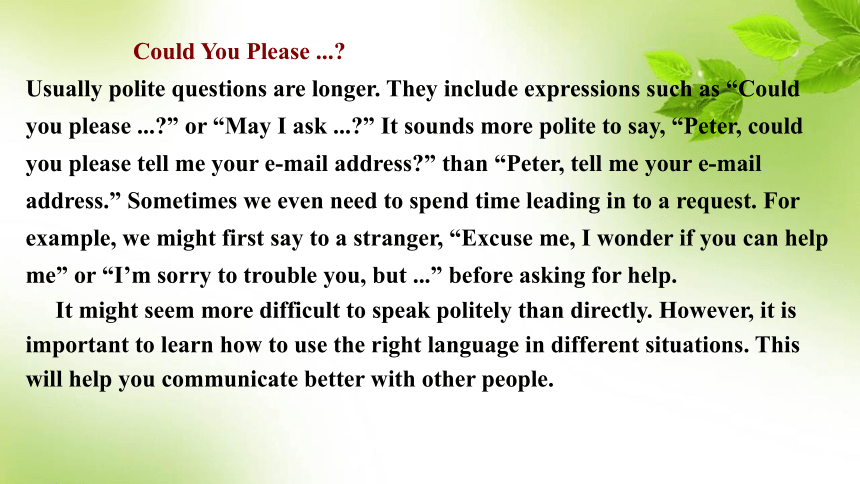
文档简介
Section B
Unit 3
Could you please tell me where
the restrooms are?
?
2a-2d
Learning Aims
1.Read to learn what the main idea is of this passage.
2.Read to learn how to make polite requests and why we have to do this.
Different people, different situations,different ways of speaking!
Where is the post office?
Pardon me, do you know if there is a restaurant near here?
Alice, tell me your telephone number.
new words
polite adj.礼貌的
(反)impolite adj.
politely adv.礼貌地
request n&v.请求
direct adj.直接的
direction n. 方向
correct adj.正确的
whom pron.谁
address n. 地址
speaker n.发言者
underground
adj.地下的;n.地铁
course n.课程
phrases
it is important to …
for example
ask for help
less polite
depend on
sound impolite
lead in to / into
communicate with sb.
the way to…
……是很重要的
例如
求助
不够礼貌的
(反)more polite
取决于
听起来不礼貌的
导入
与某人交流
去……的路上
2021/8/14
impolite
a direct question
polite
politely
While you read
2021/8/14
Sure. There’s an underground parking lot over there.
Pardon me, could you please tell me where to park my car?
a polite request
要求,请求
Discussion
Where do you need to make polite requests? Think of some possible situations. Discuss them with your partner.
2a
Could You Please ...?
When you visit a foreign country, it is important to know how to ask for help politely. For example, you may ask“ Where are the restrooms?” or “Could you please tell me where the restrooms are?”These are similar requests for directions. Both are correct, but the first one sounds less polite. That is because it is a very direct question. It is not enough to just ask a question correctly. We also need to learn how to be polite when we ask for help.
Good speakers change the way they speak in different situations. The expressions they use might depend on whom they are speaking to or how well they know each other. It is all right to ask direct questions to your classmates because you know them well. However, If you say to your teacher, “When is the school trip?”, this might sound impolite. But if you say, “Excuse me, Mr. West. Do you know when the school trip is?”, this will sound much more polite.
Could You Please ...?
Usually polite questions are longer. They include expressions such as “Could you please ...?” or “May I ask ...?” It sounds more polite to say, “Peter, could you please tell me your e-mail address?” than “Peter, tell me your e-mail address.” Sometimes we even need to spend time leading in to a request. For example, we might first say to a stranger, “Excuse me, I wonder if you can help me” or “I’m sorry to trouble you, but ...” before asking for help.
It might seem more difficult to speak politely than directly. However, it is important to learn how to use the right language in different situations. This will help you communicate better with other people.
Read the article and underline the topic sentence for each paragraph.
2b
When you visit a foreign country, it is important to know how to ask for help politely (adv. 礼貌地) ….
Reading
Paragraph 1
Good speakers change the way they speak in different situations. …
n. 发言者
Usually polite questions are longer. They include expressions such as “Could you please …?” or “May I ask …?” It sounds more polite to say, “Peter, could you please tell me your e-mail address?”…
n. 地址
Paragraph 2
Paragraph 3
在不同情况下
However, it is important to learn how to use the right language in different situations. …
Paragraph 4
语言
Direct questions
Polite requests
Where are the restrooms?
Find the direct questions and polite requests from the passage.
2c
P23
When is the school trip?
Where’s the post office?
Could you please tell me where the restrooms are?
Excuse me, Mr. West. Do you know when the school trip is?
Peter, could you please tell me your e-mail address?
Which is more polite?
Pardon me, could you please tell me where to park my car?
Request
Person
Place
1. Will you pass the salt?
2. Do you know where I can change some money, please?
3. Could you tell me what just happened?
4. Can you please tell me where the nearest station is?
5. Excuse me, do you know what time it begins, please?
6. Let me know when you’re ready, OK?
7. Could you possibly tell me the way to the village school?
A
restaurant/ home
B
street
A/B
any public place/home
B
B
B
A
movie theater /concert hall
street
home
street
Read the requests below. In the second column, write A if you would say it to someone you know and B if you would say it to a stranger. In the last column, write where you think these people are.
2d
P23
2021/8/14
1. make requests politely
request n. 要求;请求
It is my last request. 这是我最后的请求。
I bought it at / by your request.
我应你的要求买下来。
I knew I shouldn’t accept anything from such a person, but I found it difficult to turn down his _____.
A. offer B. suggestion
C. request D. plan
表示主动提供,用offer。
A
Language points
2021/8/14
2. …, could you please tell me where to park my car?
park 在这里作动词,意思是“停车;停放”。
You can park your car over there.
你可以把汽车停放在那儿。
parking是不可数名词, 意为“停车, 泊车”。
parking还可以意为“停车场, 停车位”, 相当于a parking lot。
He drove the car into the parking (lot).
他把车开进了停车场。
park还可以用作可数名词, 意为“公园”。
知识拓展
3. I look forward to your reply.
我期待您的回复。
(1)look forward to表示“盼望;期待”,相当于
expect,特指以特别愉快的心情期待着。 其
中to为介词,后面接V-ing形式。
译:我期待着再次见到你。
误:I’m looking forward to see you again.
正:I’m looking forward to seeing you again
(2)reply用作名词,意为“答复”,相当于answer, 表示“......的答复”时,reply与answer都需要与to连用。
? I received no reply/answer to my request.
我的要求没有收到任何答复。
①reply用作不及物动词,意为“回答,回 复”, reply to sb./sth.表示“对某人/某事作 出回答”。用作及物动词,其后可接宾语从句。
?She cried, but didn’t reply.
她哭了,但没有回答。
?He didn’t reply to my letter.
他没有回复我的信。
②answer作及物动词,其后可直接跟名词或代 词作宾语。
? Please answer my question.
请回答我的问题。
拓展:
1、礼貌地请求帮助 ask for help politely
2、礼貌地提要求make requests politely
3、礼貌地问问题ask questions politely
4、礼貌的问题 polite questions
5、直接的问题direct questions
6、直接地问问题ask questions directly
7、正确地问问题 ask questions correctly
8、不同的情景different situations
9、优秀的说话者good speakers
10、听起来不礼貌的sound impolite
11、改变说话的方式change the way they speak
12、导入一个请求lead in to a request
13、spend的固定搭配 (1)Sb spend some time/money on sth
(2)Sb spend some time/ money (in )doing sth.
(1)形容词作定语:即adj.+ n. ,上面的十个短语中,短语4、5、8、9_是属于这种结构的。
(2) 形容词作表语:即系动词+adj.,上面的十个短语中,
短语 10 是属于这种结构的。
副词的用法: 修饰行为动词用副词
短语1、2、3、6、7都是属于这种结构
我都 学会了!
本课句型
Summary
Key words & phrases:
politely, request, direction, correct, polite, direct, indirect,
speaker, whom, impolite, address
Key sentences:
1. The expressions they use might depend on whom they
are speaking to or how well they know each other.
2. It might seem more difficult to speak politely than
directly.
3. However, it is important to learn how to use the right
language in different situations.
Different people, different situations,different ways of speaking!
Exercises
一. 根据句意及首字母提示, 用单词的正确形式填空。
1.Good _____ (speak) change the way they speak in different situations.
2. Excuse me. Where should I p______ my car?
3. His d______(direction) answer made the girl very embarrassed.
4.Please write down your _____ (地址)on a piece of paper.
5.His father goes to work by _____ (地铁).
speakers
ark
irect
address
underground
根据汉语意思完成下列句子。
1、打扰了,你能告诉我去电影院的路么?
Pardon me, could you please show me
____ ____ _____ the cinema?
2、我去过许多城市,比如北京、上海、广州。
I have been to many cities, ____ _____ Beijing, Shanghai and Guangzhou.
the way to
for example
3. 说话有礼貌会帮你和别人更好地交流。
Speaking politely can help you ________ better _______others.
4. 我们不能永远依靠父母。
We can't _____ ____ our parents forever.
5.我们用一些额外语言导入一些请求。
We use some extra language to ____
___ _____ a request.
communicate
with
depend on
lead
in to
Homework
1.请根据本节课所学,有针对性地梳理并记忆词汇与语言知识。
2.如果你的作业需要帮助,你怎样向你的父母、朋友或老师提要求?编写一组对话。
Thank you !
Unit 3
Could you please tell me where
the restrooms are?
?
2a-2d
Learning Aims
1.Read to learn what the main idea is of this passage.
2.Read to learn how to make polite requests and why we have to do this.
Different people, different situations,different ways of speaking!
Where is the post office?
Pardon me, do you know if there is a restaurant near here?
Alice, tell me your telephone number.
new words
polite adj.礼貌的
(反)impolite adj.
politely adv.礼貌地
request n&v.请求
direct adj.直接的
direction n. 方向
correct adj.正确的
whom pron.谁
address n. 地址
speaker n.发言者
underground
adj.地下的;n.地铁
course n.课程
phrases
it is important to …
for example
ask for help
less polite
depend on
sound impolite
lead in to / into
communicate with sb.
the way to…
……是很重要的
例如
求助
不够礼貌的
(反)more polite
取决于
听起来不礼貌的
导入
与某人交流
去……的路上
2021/8/14
impolite
a direct question
polite
politely
While you read
2021/8/14
Sure. There’s an underground parking lot over there.
Pardon me, could you please tell me where to park my car?
a polite request
要求,请求
Discussion
Where do you need to make polite requests? Think of some possible situations. Discuss them with your partner.
2a
Could You Please ...?
When you visit a foreign country, it is important to know how to ask for help politely. For example, you may ask“ Where are the restrooms?” or “Could you please tell me where the restrooms are?”These are similar requests for directions. Both are correct, but the first one sounds less polite. That is because it is a very direct question. It is not enough to just ask a question correctly. We also need to learn how to be polite when we ask for help.
Good speakers change the way they speak in different situations. The expressions they use might depend on whom they are speaking to or how well they know each other. It is all right to ask direct questions to your classmates because you know them well. However, If you say to your teacher, “When is the school trip?”, this might sound impolite. But if you say, “Excuse me, Mr. West. Do you know when the school trip is?”, this will sound much more polite.
Could You Please ...?
Usually polite questions are longer. They include expressions such as “Could you please ...?” or “May I ask ...?” It sounds more polite to say, “Peter, could you please tell me your e-mail address?” than “Peter, tell me your e-mail address.” Sometimes we even need to spend time leading in to a request. For example, we might first say to a stranger, “Excuse me, I wonder if you can help me” or “I’m sorry to trouble you, but ...” before asking for help.
It might seem more difficult to speak politely than directly. However, it is important to learn how to use the right language in different situations. This will help you communicate better with other people.
Read the article and underline the topic sentence for each paragraph.
2b
When you visit a foreign country, it is important to know how to ask for help politely (adv. 礼貌地) ….
Reading
Paragraph 1
Good speakers change the way they speak in different situations. …
n. 发言者
Usually polite questions are longer. They include expressions such as “Could you please …?” or “May I ask …?” It sounds more polite to say, “Peter, could you please tell me your e-mail address?”…
n. 地址
Paragraph 2
Paragraph 3
在不同情况下
However, it is important to learn how to use the right language in different situations. …
Paragraph 4
语言
Direct questions
Polite requests
Where are the restrooms?
Find the direct questions and polite requests from the passage.
2c
P23
When is the school trip?
Where’s the post office?
Could you please tell me where the restrooms are?
Excuse me, Mr. West. Do you know when the school trip is?
Peter, could you please tell me your e-mail address?
Which is more polite?
Pardon me, could you please tell me where to park my car?
Request
Person
Place
1. Will you pass the salt?
2. Do you know where I can change some money, please?
3. Could you tell me what just happened?
4. Can you please tell me where the nearest station is?
5. Excuse me, do you know what time it begins, please?
6. Let me know when you’re ready, OK?
7. Could you possibly tell me the way to the village school?
A
restaurant/ home
B
street
A/B
any public place/home
B
B
B
A
movie theater /concert hall
street
home
street
Read the requests below. In the second column, write A if you would say it to someone you know and B if you would say it to a stranger. In the last column, write where you think these people are.
2d
P23
2021/8/14
1. make requests politely
request n. 要求;请求
It is my last request. 这是我最后的请求。
I bought it at / by your request.
我应你的要求买下来。
I knew I shouldn’t accept anything from such a person, but I found it difficult to turn down his _____.
A. offer B. suggestion
C. request D. plan
表示主动提供,用offer。
A
Language points
2021/8/14
2. …, could you please tell me where to park my car?
park 在这里作动词,意思是“停车;停放”。
You can park your car over there.
你可以把汽车停放在那儿。
parking是不可数名词, 意为“停车, 泊车”。
parking还可以意为“停车场, 停车位”, 相当于a parking lot。
He drove the car into the parking (lot).
他把车开进了停车场。
park还可以用作可数名词, 意为“公园”。
知识拓展
3. I look forward to your reply.
我期待您的回复。
(1)look forward to表示“盼望;期待”,相当于
expect,特指以特别愉快的心情期待着。 其
中to为介词,后面接V-ing形式。
译:我期待着再次见到你。
误:I’m looking forward to see you again.
正:I’m looking forward to seeing you again
(2)reply用作名词,意为“答复”,相当于answer, 表示“......的答复”时,reply与answer都需要与to连用。
? I received no reply/answer to my request.
我的要求没有收到任何答复。
①reply用作不及物动词,意为“回答,回 复”, reply to sb./sth.表示“对某人/某事作 出回答”。用作及物动词,其后可接宾语从句。
?She cried, but didn’t reply.
她哭了,但没有回答。
?He didn’t reply to my letter.
他没有回复我的信。
②answer作及物动词,其后可直接跟名词或代 词作宾语。
? Please answer my question.
请回答我的问题。
拓展:
1、礼貌地请求帮助 ask for help politely
2、礼貌地提要求make requests politely
3、礼貌地问问题ask questions politely
4、礼貌的问题 polite questions
5、直接的问题direct questions
6、直接地问问题ask questions directly
7、正确地问问题 ask questions correctly
8、不同的情景different situations
9、优秀的说话者good speakers
10、听起来不礼貌的sound impolite
11、改变说话的方式change the way they speak
12、导入一个请求lead in to a request
13、spend的固定搭配 (1)Sb spend some time/money on sth
(2)Sb spend some time/ money (in )doing sth.
(1)形容词作定语:即adj.+ n. ,上面的十个短语中,短语4、5、8、9_是属于这种结构的。
(2) 形容词作表语:即系动词+adj.,上面的十个短语中,
短语 10 是属于这种结构的。
副词的用法: 修饰行为动词用副词
短语1、2、3、6、7都是属于这种结构
我都 学会了!
本课句型
Summary
Key words & phrases:
politely, request, direction, correct, polite, direct, indirect,
speaker, whom, impolite, address
Key sentences:
1. The expressions they use might depend on whom they
are speaking to or how well they know each other.
2. It might seem more difficult to speak politely than
directly.
3. However, it is important to learn how to use the right
language in different situations.
Different people, different situations,different ways of speaking!
Exercises
一. 根据句意及首字母提示, 用单词的正确形式填空。
1.Good _____ (speak) change the way they speak in different situations.
2. Excuse me. Where should I p______ my car?
3. His d______(direction) answer made the girl very embarrassed.
4.Please write down your _____ (地址)on a piece of paper.
5.His father goes to work by _____ (地铁).
speakers
ark
irect
address
underground
根据汉语意思完成下列句子。
1、打扰了,你能告诉我去电影院的路么?
Pardon me, could you please show me
____ ____ _____ the cinema?
2、我去过许多城市,比如北京、上海、广州。
I have been to many cities, ____ _____ Beijing, Shanghai and Guangzhou.
the way to
for example
3. 说话有礼貌会帮你和别人更好地交流。
Speaking politely can help you ________ better _______others.
4. 我们不能永远依靠父母。
We can't _____ ____ our parents forever.
5.我们用一些额外语言导入一些请求。
We use some extra language to ____
___ _____ a request.
communicate
with
depend on
lead
in to
Homework
1.请根据本节课所学,有针对性地梳理并记忆词汇与语言知识。
2.如果你的作业需要帮助,你怎样向你的父母、朋友或老师提要求?编写一组对话。
Thank you !
同课章节目录
- Unit 1 How can we become good learners.
- Section A
- Section B
- Unit 2 I think that mooncakes are delicious!
- Section A
- Section B
- Unit 3 Could you please tell me where the restroom
- Section A
- Section B
- Unit 4 I used to be afraid of the dark.
- Section A
- Section B
- Unit 5 What are the shirts made of?
- Section A
- Section B
- Review of Units 1-5
- Unit 6 When was it invented?
- Section A
- Section B
- Unit 7 Teenagers should be allowed to choose their
- Section A
- Section B
- Unit 8 It must belong to Carla.
- Section A
- Section B
- Unit 9 I like music that I can dance to.
- Section A
- Section B
- Unit 10 You're supposed to shake hands.
- Section A
- Section B
- Review of Units 6-10
- Unit 11 Sad movies make me cry.
- Section A
- Section B
- Unit 12 Life is full of the unexpected
- Section A
- Section B
- Unit 13 We're trying to save the earth!
- Section A
- Section B
- Unit 14 I remember meeting all of you in Grade 7.
- Section A
- Section B
- Review of Units 11-14
